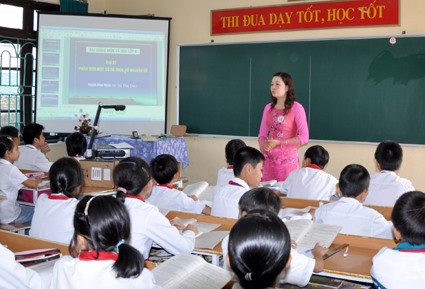 Op-Ed
Op-Ed

Stories about unsavoury incidents at schools have been doing the rounds a lot these days.
However, most of them have involved some kind of misbehaviour by students, followed sometimes by improper responses from teachers or school administrations. The latest one was a bit different.
 |

|
Stories about unsavoury incidents at schools have been doing the rounds a lot these days.
However, most of them have involved some kind of misbehaviour by students, followed sometimes by improper responses from teachers or school administrations.
The latest one was a bit different.
A grade two student at the Nam Trung Yên Primary School in Hà Nội’s Cầu Giấy District was rushed to hospital after an unexpected accident during recess. Unfortunate, but the incident would have not have blown out of proportion if it had been dealt with in a straightforward way by the school management. In this case, the principal should have accepted responsibility, apologized, and helped the student.
Unfortunately, this did not happen.
In an urgent petition sent to relevant authorities and media, the child’s father, Trần Chí Dũng said he had been informed by the school that his son stumbled and fell when playing on the school playground.
The child had told the parents that he had been hit by a blue car as he and his classmates rushed to the class after the break He said he saw the school’s principal and another teacher inside the car.
Doctors from Việt Nam National Hospital of Pediatrics (where the child was first transported to) and the Việt-Đức Hospital said he must have suffered a hard hit from outside, resulting in a broken thigh bone. He also suffered a long wound that needed to be sewn up, as shown in photos sent to local media.
The case is under police investigation.
The school has since sent inconsistent, unpersuasive reports to the district’s education department and media, leading to public discontent. The school asserted that the school principal was not in the car, and that cars are never allowed to run on its premises.
Then, with the discontent still simmering, the principal asked all the school teachers, administrative staff and students to fill in a survey. A 100 per cent of the responses said they saw no car run in or out of the school that time. Even those who might weren’t at the scene vouched for the absence of a car. So, the students were made to lie, not tell a white lie.
During a working session between the school and the district’s education department this week, the principal conceded she did allow a taxi to go through the school’s back gate when she used it to go for a medical check-up.
The principal has failed her peers, her students and their parents.
As the leader of a school, she should have set an example for everyone. More than others, she should have known that her actions can have a lasting psychological impact on the lives of the children in her school, and beyond.
“If the school’s management board – those who sail the education boat – are competent and dedicated, and set good examples, they will create a strong contingent of school teachers that are whole-heartedly devoted to the welfare of students,” said Hoàng Thái Hùng, a teacher at Thành Nhân School, HCM City.
“Educating the youth is not purely theory. It should go along with practical actions that give students the confidence to repose their entire trust in the teachers and in the school.”
As a mother of two, I am not happy to hear such stories. One that shocked me recently was an incident at a primary school in Hà Nội’s Thường Tín District. A teacher asked all the other 43 students to slap a classmate’s face as punishment for quarrelling with another classmate.
Although the teacher, with 21 years of experience, has apologised to the student and has been asked to stop work, the impacts of her action on all students who were directly involved or learnt about it will not be good.
The late Prime Minister Phạm Văn Đồng once said: “Teaching is the noblest of noble professions… and the teacher gives the student not only knowledge but the know-how to become a good citizen.”
The cases mentioned above can be seen as flies in the ointment. There are good stories aplenty. Images of teachers in flood-hit central regions drying textbooks and cleaning up school facilities so that students can return as soon as possible warmed the hearts of people all over the country. An award-winning architect and lecturer of the National University of Civil Engineering spent almost ten years building a dreamlike school for children in the mountainous, underprivileged Lũng Luông Commune in Thái Nguyên District. A teacher in Nghệ An Province saves part of his modest wages every month to pay tuition fees for a local student.
In the case of the boy hit by the car, the father said all the family wanted to do was make clear the cause of the accident and avoid similar mishaps from happening to others. They would have not created a furore if the school leadership had acted responsibly and accepted responsibility right at the beginning.
Such events are likely to provoke calls for a “Code of Ethics” for teachers, for relevant moral lessons to be included in textbooks and so on, but the real lesson that they teach us, particularly adults, parents and teachers (in fact, we are all teachers), is this: What the teacher is, is more important than what she/he teaches.
Surely enough, the student learns not only the knowledge, but the behaviour and dignity of the teacher. Thus, education will reach its good end if the teacher knows how to “use virtues to disseminate virtues”.
Aristotle said "educating the mind without the heart is no education at all.” We should take this to heart. — VNS




